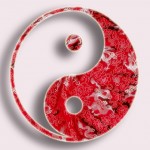Feng shui is an ancient art developed in China over 3,000 years ago. Its goal is to balance the energies of any given space to assure health, wellness and good fortune to those who inhabit it. Like acupuncture, feng shui is based on the principle of qi, an energy that fills our spacesand makes it feel “alive”. You may have heard the expression that the space has “good feng shui” or even walked into a space yourself and had a good or bad feeling when you did. One of the objects of feng shui is to create a free path for the qi to flow throughout your home. Picture qi as a gentle stream flowing through your home. By doing a simple walk through your home you can see where the stream flows smoothly and where clutter and objects get in its way.
An important principle of feng shui is the theory of yin and yang or balance. This theory believes that everything in the universe consists of two opposing energies –
yin and yang. Yin and yang cannot exist without one another. Simple examples of yin and yang are night and day, hot or cold, relaxed or uptight, happy or
sad. Creating a home that has a balance of yin and yang is very important in feng shui. For example, yin energy should be prominent in your bedroom. Yin is relaxing and soothing and will support your body’s ability to sleep. Yin colors and sounds will be very helpful in the bedroom. On the other hand, Yang dominant items like the television and computer in the yin space of the bedroom can lead to insomnia and difficulty relaxing. Keeping the yang items in their appropriate places (the living room and kitchen), will help to bring sanctity and balance to your home.
Feng Shui
also views the five elements (wood, fire, earth, metal and water) as very important to be included in a home design. According to Terah Kathryn Collins, Founder of the Western School of Feng Shui in San Deigo “when all 5 are included in your home design, health and happiness are best held in place”. Each element can be expressed in a variety of ways. This can include items that are made out of an element (wood or metal), objects that are associated with an element (plants are associated with earth) or colors that take on an element (red is associated with fire, white is associated with metal).
Feng Shui views all things and creatures as part of a natural order that is constantly moving and changing. Feng Shui divides our never- ending universe into more manageable units — like human beings and their homes, property, offices, living rooms, and bedrooms. Feng Shui allows you to design your personal space according to the same universal principles of energy flow that governs the wind, fire, earth, metal and water.
Next time you feel out of balance – look objectively to your home and surroundings; finding a way to create inner peace through your outer environment.
For more information on Feng Shui in the Metro Detroit area – visit the web site of Catherine Hilker, a Michigan based Feng Shui consultant that provides consulting for bot hhome and office. Acupuncture Healthcare Associates utilized her services for our lovely office!


Leave a Reply